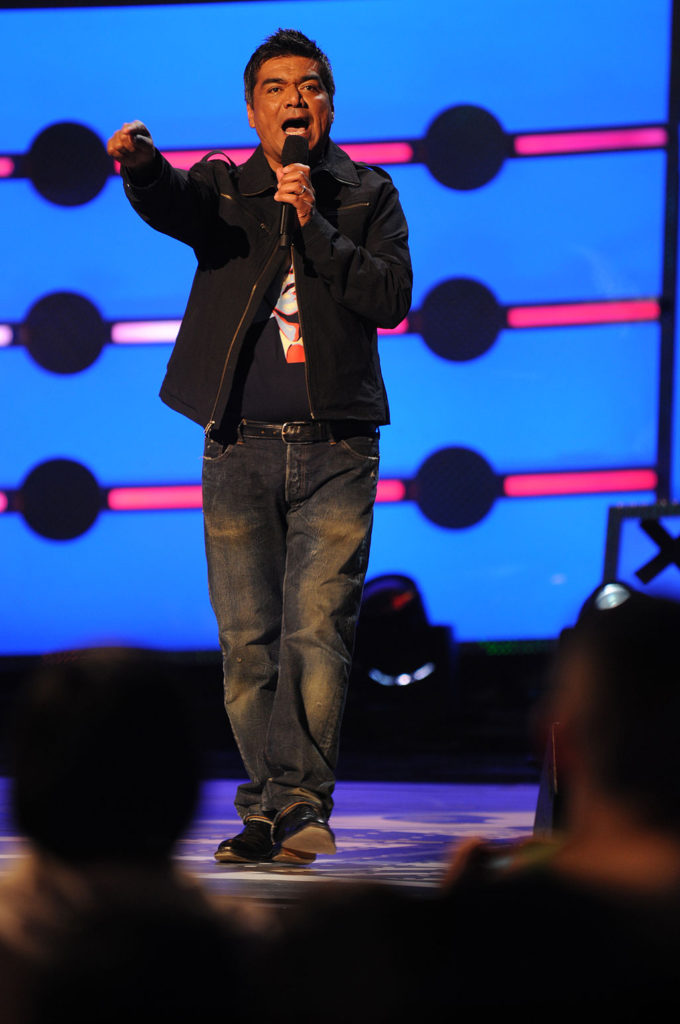
You might have missed it, given the state of the nation and world, but George Lopez released a stand-up special at the end of June on Netflix. “We’ll Do it for Half,” the title of the special is an allusion to a controversy that Lopez was involved in, a joking tweet about a rumored bounty on Trump issued by Iran.
Lopez continues to be one of the most famous Latino actors and comedians, who has used his celebrity to weigh in on politics. The titles of his stand-up specials alone indicate this, “America’s Mexican,” “Tall, Dark, and Chicano,” and “The Wall.” “Tall, Dark, and Chicano” in 2009 was released during Obama’s presidency, but revealed the cracks in the purported era of post-racial America. Lopez was coming off his sitcom and was angry about the comedic, directorial, and content concessions he had to make appeal to white audiences in order to be “mainstream.” No longer under the constraints of media whitewashing, he was a dark Chicano and he had something to say.
Since then, though his support of liberal and Latino politics has been steadfast, his cultural politics have been uneven. He starred in El Chicano, which was billed as the first Chicano super hero movie. Unfortunately it was an unbalanced attempt to put Mexican-Americans on the right side of the thin blue line. His anti-black jokes have been criticized and, yet, he’s defended them.
In his later specials, and especially in his most recent, Lopez’s jokes about young people turn him into a crank, a near-boomer complaining about how all young Latinxs are pampered, privileged, whiners who are petulant and perpetual babies because they didn’t grow up with the same traumas as the prior generations.
This is an unfortunate turn in his comedy and outlook.
His early comedic success was based on making fun of the traumas that so many Latinxs, and especially Chicanas and Chicanos, endured growing up in poverty. His comedy didn’t minimize traumas. He exposed them. Growing up in poverty meant broken homes, alcoholism, verbal, emotional and physical abuse, food scarcity, housing insecurity, sexism, even environmental racism. The early jokes were meant to show that Latinxs were not the sum of their traumas. That, yes, they experienced those traumas and they shaped who we were, but laughing about them was a way of putting them to rest. It was not necessary for Latinx parents to impose those traumas on their children. They could move past them. The stories and the jokes he told about trauma were funny, because they were past. We could all laugh because they were sepia-toned memories of childhoods that would be remembered but not passed onto the next generation of children.
His 2005 special, “Why you Crying?,” was based on the premise that Latinx parents in the past hit their kids, often crossing the line of discipline into abuse. He enumerated the various ways he was abused and the reasons why. To uproarious laughter, he admitted that parents of his generation “raised us to be insecure,” with constant verbal abuse. They hit children out of anger, frustration, and because of emotional detachment. Jokes about chanclas always get laughs. But then he revealed, “my daughter is 8, never been hit.” Lopez could laugh at his past because it was not part of his present and would not be part of the future. At the end of the special he urged, “remember all that stuff” but “allow them to dream, that’s the most important thing.” He concluded: “Look, no one ever told me I could do shit with my life…Whatever child you have whatever age they are, encourage them to do better than you and to go to school and to dream and become whatever they want.”
A similar theme appeared in his 2007 special “America’s Mexican.” He makes light of his grandparents’ parenting style. He was not read to, perhaps because of his grandparents’ limited literacy. He was thrown into a pool to literally sink or swim. He jokes that as a poor Mexican-American kid, he didn’t have access to a pool so he swam in the uneven part of the cement where water collected. Children of his generation didn’t get whole popsicles. (They were too poor.) They were not given allowances. (His grandma would say: you do “I allow you to live.”) All of this leads him to declare that “kids today wouldn’t last one day of our childhoods.”
But that was a tacit acknowledgement that the childhood of his children was nearly unrecognizable to him as well. In a mocking tone, he chides gogurts, lunchables, and juice boxes. “We didn’t have the shit they have,” he quips. Instead, they had weenies and Tapatio. Instead of expensive juice boxes that his children have, he grew up with water from the hose. All those experiences shaped him and his generation. However, they stopped with him.
In that special he remarks, “my daughter’s 10, she gets read bed time stories every night.” His daughter is no longer drinking from hoses laden with carcinogens and lead. She has access to juice boxes. Lopez and his audience were laughing at the chasm between their experiences and their children. And while they noted that those things shaped the people they grew up to become, those experiences also damaged them, inflicted trauma upon them that they did not want their children to experience. That was the collective release of the comedy; that the traumas of the past would not be passed on, only the joys that come with learning to overcome adversity.
But then, his cultural politics shifted.
Perhaps it had to do with the hardening of politics and the rise of anti-Latino sentiment in the 2010s. In the anti-Latino climate of the Minutemen, Tea Party, and the forces that gave rise to Trump, Lopez reacted by retreating into a cultural bunker. His jokes, which had previously revealed the shortcomings of Latinx culture, made a turn toward reverence of tradition. Somehow the positive changes in Latinx parenting were now sad affects of a white American culture that had changed the community, and not for the better.
By his 2009 special, the kids were no longer alright. They were pampered and babied. They were scared of the dark. They were scared of Halloween costumes. They were afraid of drowning. All of this, according to Lopez, was the fault of their parents. Parents had become too friendly with their children, crossing a line into being friends with their children and not parents. “I hated my grandfather. I hated my grandmother. I think I turned out ok” he exclaims.
He elaborated on this point in his 2017 special, “The Wall.” He begins his set-up with the observation of a young child throwing a tantrum because his food was touching on the plate. He asks the audience, “Ask yourself if you could have gotten away with that shit?” The set-up leads him to his statement on Latinx parenting: “You don’t baby. Our parents and our culture shows us that it’s not all compliments. It’s not everything you do is amazing.” In short, the strength of Latinxs was based on the traumatic parenting style of their predecessors. While it may hurt, while it may be abusive, while it may traumatize, at least “you don’t have a distorted view of life. Not everything is wonderful.”
In his latest special, Lopez belabors the point that Latinx culture is markedly different from American culture. While this is a tried and true trope of ethnic humor, Lopez uses this differentiation not for cultural resistance, but reverence. “That’s who we are” he says of his upbringing. “We were raised by the original body shamers,” he extols. “All the parents are nice now,” he bemoans. Latinos are different. “We don’t disrespect out parents. We don’t talk back.” If that happens, parents dole out retribution. Physical and verbal abuse: “That’s how you get respect!” he exclaims. In his new special he celebrates sexism, homophobia, obesity, and trauma as quintessential to being Latinx. In his latest special, it is not the surviving of trauma that makes Latinxs, but its maintenance.
Lopez is not officially a baby-boomer. Born in 1961, he’s one year too late for that designation. While it could seem that this is just another inevitable conflict of generations, generational conflict is rarely if ever only a contest between age groups. More often the conflicts are political and ideological. What then are the ideas and politics of Lopez’s generation that was formed between the Chicano Movement and the Decade of the Hispanic? Why is it so important for Lopez that the traumas of his childhood are passed on to the next generation?
Maybe, this isn’t just generational crankiness. Perhaps Lopez’s retreat into a cultural bunker is a political expression. In an anti-Latinx climate like our own, any calling out of our own cultural shortcomings could be used as an inroad into cultural denigration. Cultural deficiency theories have a long history in the US and still have incredible power today.
Maybe his parental crankiness is the expression of parental guilt. The nation that his children and young Latinxs are facing is different. The most common age for a US-born Latinx is 11 years old and they are growing up in a climate of hate that has not been rivaled in recent history. Perhaps Lopez believes that without the trauma of being insulted, yelled at, and beaten, they have left their children without the tools to confront a nation that is ready to do all those things and more. As coach Doc Rivers, who is the same age as Lopez, said “It’s amazing why we keep loving this country and this country does not love us back.”
Lopez’s cranky parental politics seem to be rooted in guilt that he and his generation bear the weight for having failed to prepare their children for the trauma they will endure in a nation that has turned abusive. But what he fails to see is that people and generations plagued by trauma often lack the emotional capacity or empathy to confront their own trauma or correct the trauma of others.


Leave a Reply